A history of Kendo in Luxembourg: Shobukai Dojo
by Dominique Gérard, Jukka Jalava and Hérold Pettiau.
A few words about Kendo and its purposes
Put shortly, Kendo can be described as “Japanese fencing”. As a discipline, following the All-Japan Kendo Federation:
“Kendo is a type of athletic contest in which practitioners wear kendo-gu (protective armor) and use shinai (bamboo swords) to strike each other. However, kendo is a budo (martial way) that aims to forge the mind and body of practitioners and facilitate the development of character through continued keiko (practice)[1]. Put it more succinctly, “the concept of kendo is to discipline the human character through the application of the principles of the katana (sword)”[2].
Kendo in Luxembourg from 1989 to 2013
Interest in the practice of kobudo started during the eighties, among some karateka, who began to attempt practicing kendo with shinai with the help of several sensei from France and Belgium. Shobukai dojo was founded in 1989 but became formally established as an ASBL in 1992. It is only when Mr Akira Yasuoka (who was then working at the well-known Kamakura Japanese Restaurant and who became “Chef of the Year » in Luxembourg for the famous culinary guide Gault Millau Belgium-Luxembourg in 2011), joined the practitioners and lead the Sunday trainings that kendo started to be established on a firmer basis in Luxembourg. Although he did not want to be considered as a sensei, he was viewed as such by all of those who practiced under his guidance. However, as Mr Yasuoka could not direct trainings during the weeks, members of the dojo turned to neighbouring Metz.
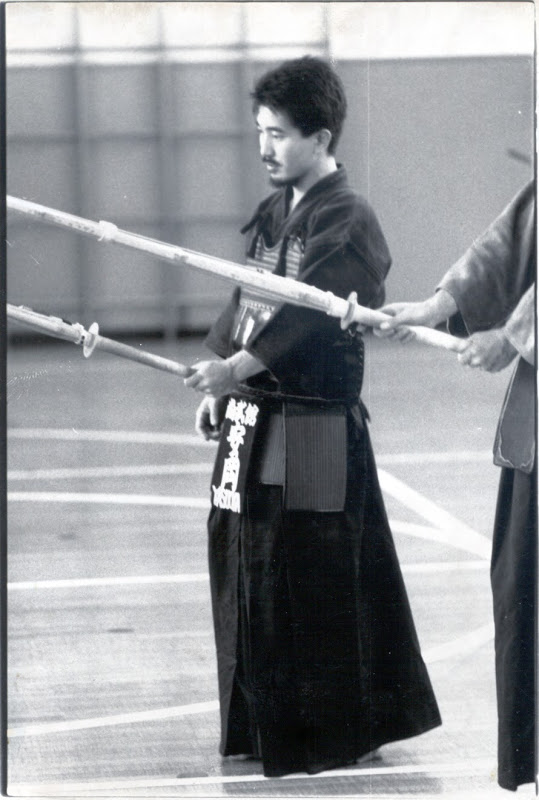
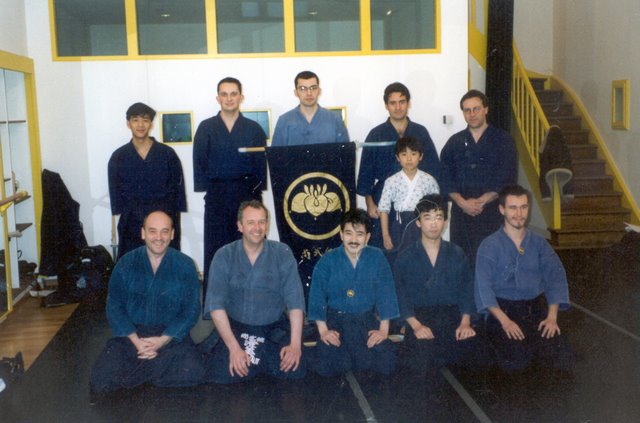
There, Dominique Coco-sensei, head of the Haku Un Kan Dojo accepted to teach kendoka from Luxembourg who use to come during the week. Later he came himself regularly to Luxembourg to enhance the quality of the teaching and led trainings for a long time, covering two decades (the 90’s and 2000’), and has continued to visit Luxemburg regularly for seminars or refereeing at competitions. He has been also instrumental in helping us to become member of the European Kendo Federation in 1993 and the International Kendo Federation. Mr Hein Odinot, president of the Dutch Kendo Federation (Nederlandse Kendo Renmei), was our sponsor.
Dominique Coco also encouraged us to take part in international kendo championships and seminars, in France, Belgium and Germany. Some members have had the occasion to visit dojo in Japan and improve their knowledge of kendo. All of this helped to maintain a fairly good level of kendo in Luxembourg.

The Luxembourg team and their coach, Dominique Coco, at the EKC in Glasgow, 1995.
Luxembourg has sent representatives at international championships; mostly the European Kendo Championship starting in 1995 in Glasgow, followed in 1996 by those in Miskolc (Hungary), in 1999 in Lourdes, in Nantes in 2002, in Budapest in 2004, Bern in 2005, in Lisbon in 2007, in Helsinki in 2008 in Clermont-Ferrand in 2014, Skopje in 2016 and Budapest in 2017. Competitors also took part in several World Kendo Championships, held every three years, notably in Kyoto in 1997, in Glasgow in 2003, and in Tokyo in 2015. On several occasion we could send a full team, but most often, we sent representatives in the individual events (e.g. the participation of Christophe Santos Fernandes to the 2015 WKC in Tokyo).

The Luxembourg team at the opening ceremony of the Kyoto WKC in 1997.
Kendo in Luxembourg from 2013 to 2021
In 2013 Shobukai Kendo Luxembourg Asbl (SKL) was continuing its regular activities by holding two trainings per week in the Mühlenbach-Eich dojo during the school year, and organising weekend seminars approximately twice per year under the guidance of European senseis. That year Dr Jukka Jalava, a former Finnish National Team member and founding member in 1986 of Finland’s first kendo dojo (Ki-Ken-Tai-Icchi, Helsinki) became a member of Shobukai and one of its main trainers. This is one of the defining characteristics of kendo in Luxembourg: the large number of experienced kendoka moving to Luxembourg for work related reasons.
In 2014 an additional weekly training for advanced members was added. It took place on the premises of INS, in Shobukai’s nostalgic original dojo: salle Fort Rubanprez. This was very useful qualitatively as the yudansha (dan-holders) in Luxembourg could now better focus on more advanced techniques amongst experienced practitioners, but also quantitatively as the INS does not close its dojo during the school holidays.
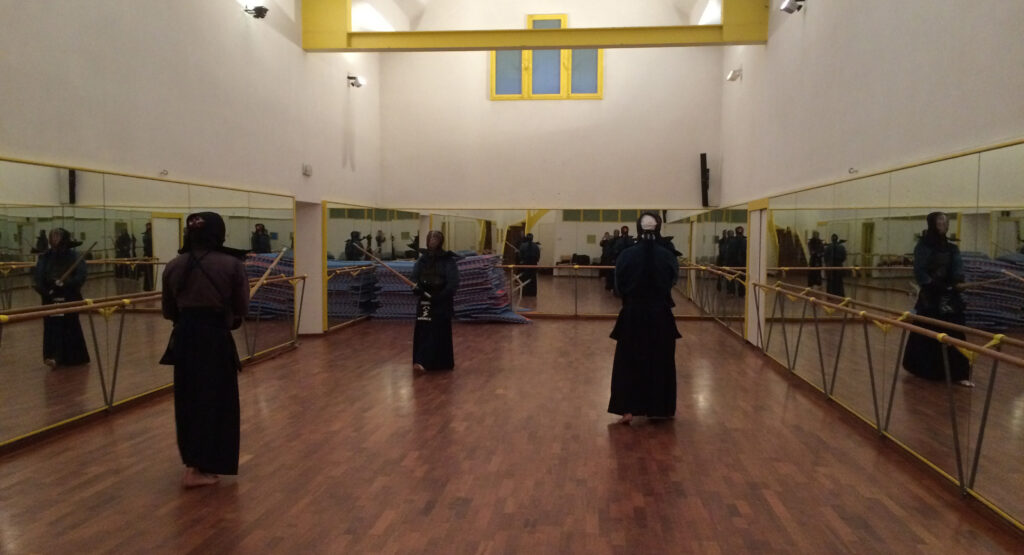
Meanwhile notably Dr Olivier Keiser and Jukka Jalava continued to actively attend seminars in Belgium, France and Germany. An important influence in that respect was the biannual seminars in Brussels led by Nobuo Hirakawa-sensei, kyoshi 8th dan, as well as the continuous support of the many kind senseis of Belgium. Olivier also actively retained a connection to Switzerland, as did Jukka to Finland.
A strong connection was established with Finland as Markus Frey-sensei, kyoshi 7th dan came for the first time in 2015 to lead a weekend seminar in Luxembourg. By 2019 he had been here already five times and his teaching was highly appreciated also by Belgian and French kenshi (incl. 7th dan sensei). Frey-sensei also designed our kyu-diploma. Another pedagogically much appreciated teacher was Claude Pruvost-sensei, kyoshi 7th dan, from France, who led seminars in Luxembourg in 2016-2018. Others who taught seminars in Luxembourg include: Sylvain Moutarde-sensei, kyoshi 7th dan, also from France, in 2013; Emilio Gomez Acero-sensei, kyoshi 7th dan, from Belgium in 2015; and Oscar Kimura-sensei, then renshi 6th dan from Switzerland, who at the time was the coach of the Swiss national team, in 2013-2014.
A major stroke of good fortune was the appointment of Yoichi Yamasaki-sensei, renshi 7th dan, as second secretary and consul at the Embassy of Japan in Luxembourg in the summer of 2016. He was stationed in Luxembourg for two years and was an active member of the club and its main teacher during his stay. Among his achievements could be highlighted winning the 7th dan category in Open de France in February 2018 (and second place the year before). An indication of the high importance and great esteem of Yamasaki-sensei is the naming to this day in SKL of one basic exercise as ‘Yamasaki-kirikaeshi’.
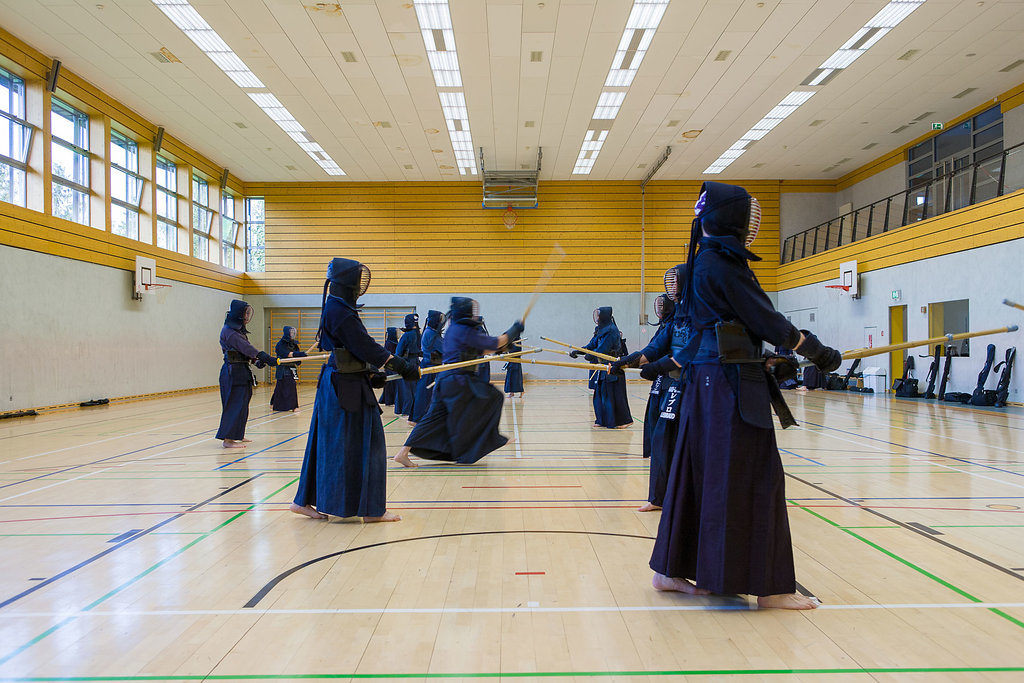
An important decision for the development of Luxembourg’s kendo was starting to invite high-level kendo teachers from Japan to Luxembourg. They usually stayed for a week and led a weekend seminar during that time. This began in 2017 with Masatake Sumi-sensei, hanshi 8th dan, from Fukuoka. In 2018 Koichiro Oshige, kyoshi 7th dan, from Miyazaki was invited (he was assisted by Katsunori Suzuki, renshi 6th dan). Both Sumi-sensei and Oshige-sensei were also assisted in their seminars by Pruvost-sensei and Yamasaki-sensei. In 2019 Koji Kazuma, kyoshi 8th dan, arrived with five students and ex-students (‘old boys’) from Kogakuin University, Tokyo. And in 2020 Koji Tanigawa, kyoshi 8th dan, from Miyazaki came to teach a seminar (assisted by Yamasaki-sensei). These high-level seminars were visited also by numerous Belgian, Dutch, Finnish, French and German kenshi.

During the presidency of SKL of Dominique Gérard (2016-) the first Luxembourgish kendo championships were organised in 2016. In 2018 the competition enlarged into the first Coupe de Kendo de l’Ambassadeur du Japon (including an open category), which was organised under the kind patronage of His Excellency the Ambassador of Japan in the Grand-Duchy of Luxembourg, Mr Shigeji Suzuki.[3]
Olivier and Jukka were regularly refereeing (shimpan) between 2014 and 2020 in France in the annual Interrégions Grand Est de Kendo. They also participated in the European Kendo Federation referee seminars held in 2019 and 2020 in Brussels. Jukka was nominated “Bénévole de l’Année 2019” by FLAM for his engagements on behalf of kendo in Luxembourg.
Romain Dias De Carvalho, long time secretary of Shobukai Kendo Luxembourg, is the founder in 2016 and main trainer of the second kendo club in Luxembourg: Shobukai Kendo Differdange Asbl (SKD). The trainings take place on Wednesday led by Romain and on Saturday led by Jukka. SKD has also a small Ono-Ha Itto-ryu kenjutsu section.
During the global COVID-19 pandemic training was prohibited from mid-March 2020 until mid-September 2020 and again for 2.5 weeks during the Christmas/New Year’s holidays 2020. However, already in mid-September 2020 organised trainings were resumed in SKL strictly following the government’s health regulations.
Qualitative improvement has quickly followed all these activities as Olivier graded 6th dan in Berlin in 2019, Jukka Jalava graded 5th dan in Chambéry in 2018, Norbert Hanck graded 5th dan in Brussels in 2020, Dominique Gérard and Romain Dias De Carvalho graded 3rd dan in Metz in 2014, Dr Hérold Pettiau graded 3rd dan in Brussels in 2016, Felipe Astorri graded 3rd dan in Brussels in 2017, and Arnaldo Marques Ferreira graded 2nd dan and Olivia Moreau 1st dan in Brussels in 2019.[4] In addition national kyu-gradings are organised regularly within the dojo.[5]
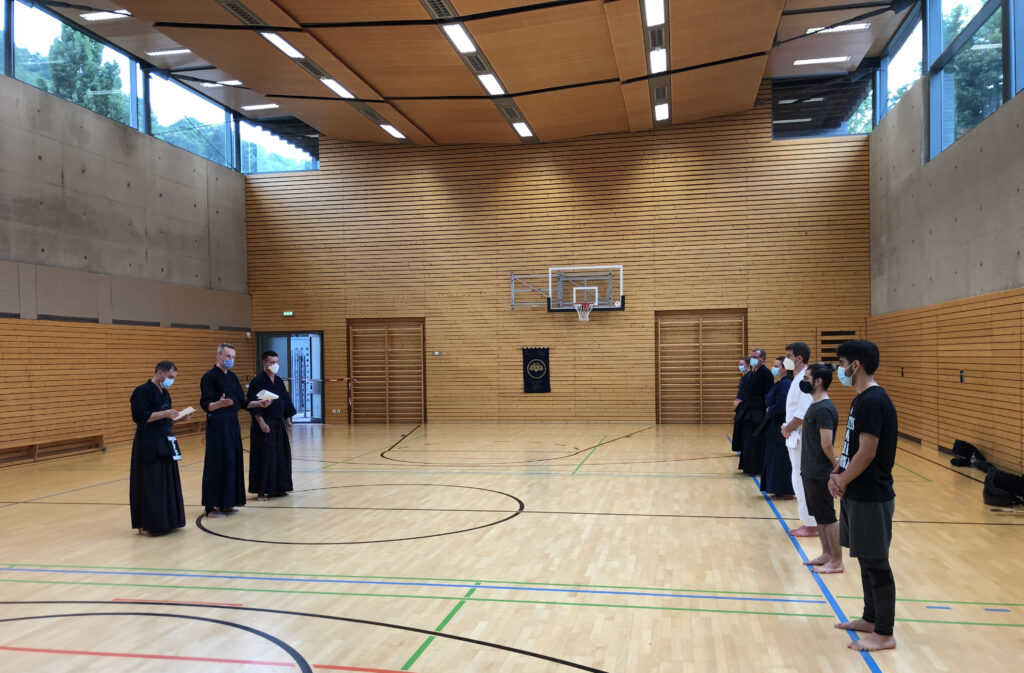
The Shobukai dojos are looking confidently towards the future. In the season 2021-2022 one of the main activities is, with the kind support of FLAM and ENEPS, a new formal kendo specific trainers’ training for our senior members under the expert leadership of Jean-Pierre Labru-sensei, kyoshi 7th dan, technical director of the European Kendo Federation.
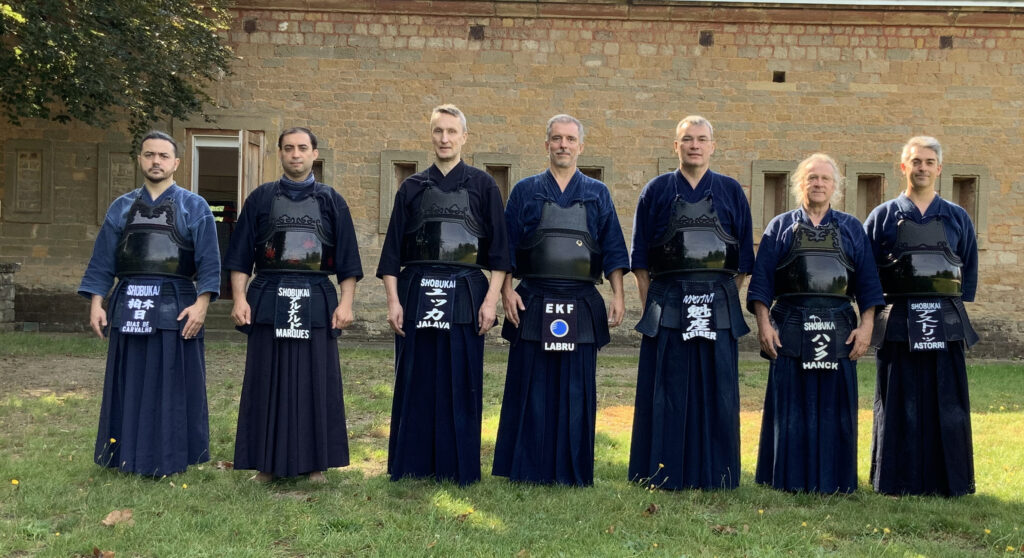
Sources and notes :
[1] Information website of the All Japan Kendo Federation : https://www.kendo.or.jp/en/knowledge/ (last viewed on 22 November 2021).
[2] https://www.kendo.or.jp/en/knowledge/kendo-concept/ (last viewed on 22 November 2021). The official purpose of Kendo is « To mold the mind and body, to cultivate a vigorous spirit, and through correct and rigid training, to strive for improvement in the art of kendo, to hold in esteem human courtesy and honour, to associate with others with sincerity, and to forever pursue the cultivation of oneself. This will make one be able : to love his/her country and society, to contribute to the development of culture, and to promote peace and prosperity among all peoples ».
[3] The championships were cancelled in 2019 in mourning of the death of HRH Grand Duke Jean of Luxembourg and in 2020-2021 due to the global COVID-19 pandemic.
[4] Members that have moved from Luxembourg or are no longer active and who graded successfully while training in Luxembourg include Raphael Yoshitomi, 5th dan; Christophe Santos Fernandes, 3rd dan; Giovanni Mazzocato, 2nd dan.
[5] Dan-gradings in kendo are internationally standardised by FIK and are in Europe organised by the EKF in grades 1-7 dan as well as nationally, with EKF approval, in grades 1-5 dan. Kyu-gradings are under national control.
